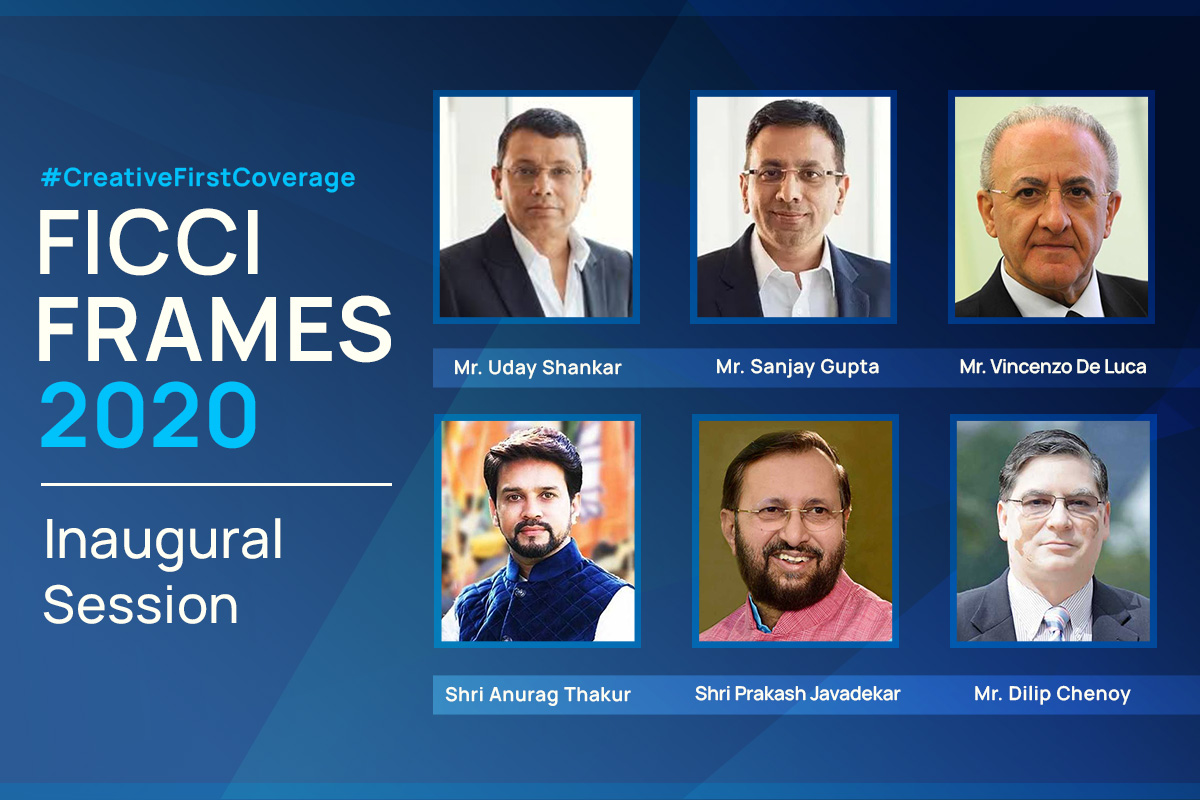
The 2020 edition of FICCI Frames, India’s largest convention on the media and entertainment industry, began today in digital format, E-Frames. The inaugural panel discussion focussed on the Role of the Creative Economy to Revitalise Economic Growth. Anurag Singh Thakur, Minister of State for Finance, Sangita Reddy, President, FICCI, Sanjay Gupta, Chairman, FICCI’s Media and Entertainment Division, Uday Shankar, Senior Vice President, FICCI, and Vincenzo De Luca, Italy’s Ambassador to India, participated in the discussion. Prakash Javadekar, the Minister for Information and Broadcasting, delivered the inaugural speech.
In his inaugural address, Mr Prakash Javadekar, assured the media and entertainment sector that the government will be its “partner”. He listed a slew of measures the Modi government shall announce take to help the sector. These include a standard operating procedure to shoot films in a post-covid scenario, incentives for TV serials, films, animation and gaming. Mr Javadekar added that more than 80 foreign film producers were provided with a single window clearance to shoot their movies in India. “Given India’s cost advantage, of 40-60 percent, for producing the same quality of content as advanced countries, we can achieve stupendous results if we work together.” He said the government stood shoulder to shoulder with the industry to help it achieve its objectives.
In her opening remarks, Ms. Reddy stressed the importance of the media and entertainment sector’s soft power, and said that FICCI has helped the sector grow many folds. She said that the organization has given input to the film production policies of Odisha and Madhya Pradesh and will do the same for Chattisgarh. Ms. Reddy highlighted areas in which the government can help to ensure the sector’s growth. This includes a five-year tax holiday, a new system to measure television rating points (TRPs), and a national centre for excellence in animation and gaming. She also added that the sector will contract significantly due to the coronavirus pandemic — a view shared by other panel members.
Mr. Shankar, senior vice president of FICCI and Chairman of Star India, said that advertising revenues for print and television had declined considerably. He added that this crisis presented the industry with an opportunity to wean itself off the ad revenue model. Mr Shankar said that consumers need to pay for what they consume and content subsidisation, via advertising, needs to change. Mr. Sanjay Gupta added that advertisement revenues for newspapers would decline by 50-90 percent. He also said that 20 percent of the workforce would be rendered jobless, as a result of this pandemic.
A common consensus amongst the panelists was that the time was ripe for India’s media and entertainment industry to scale its ambitions. Mr Shankar lamented that regulators and the industry worked together to create hurdles and prevent the sector from unlocking its true potential. This, he said, needed to change because the content business has now gone global.
India should emulate the examples of Turkey and South Korea — countries that have successfully exported their content.
Mr Shankar added that India’s content “lacked ambition” — something that needed to change.
Mr Gupta echoed Mr Shankar’s view and cited the examples of the Ramayana and Mahabharata as stories that captured global imaginations much before the boom in digital media. “Limiting the media and entertainment sector to just economic value, ignores its true potential,” he said. “We need to recognise the true potential and understand that this sector can have multiplier effects.” Mr. Gupta advocated for light touch regulatory approaches, a fragmented approach to taxation and the need to resolve tax burdens on direct-to-home (DTH) services, to help the sector revive.
“We can be a creative powerhouse that can deliver globally. The opportunity is not only to Make in India but also light up the world,” he added.
Ambassador De Luca said that Italy was perfectly poised to help Indian content achieve these global ambitions and added that his country offered tax incentives for film productions.
“In 2008, the Italian government introduced a Film Production Tax Incentive scheme under which companies get a 30 percent tax credit on production expenses.”
In his concluding remarks, Anurag Singh Thakur acknowledged the phenomenal rise of OTT platforms. He added that these could help vernacular language content produced in India find a wide audience and also help bridge the gap between Bollywood and other regional language industries. “Prime Minister Modi said that we must find opportunities in times of crisis. This is the perfect opportunity to demonstrate India’s soft power,” he added. Mr Thakur urged the media and entertainment sector to highlight stories of Aatmanirbhar Bharat and promote yoga and ayurveda. He added that the Modi government was here to help the sector and urged representatives of the sector to use FICCI as a bridge to reach out to the Finance and Information and Broadcasting Ministries.
The inaugural session of FICCI Frames 2020 can be viewed below.